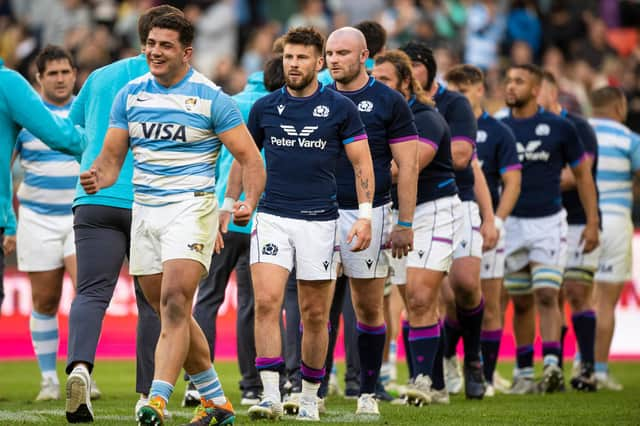Scottish rugby: Mismatch between expectations and reality is more evident than ever before


There are, JJ admitted, too many areas where failure is more usual than success now. In particular, something has gone badly wrong with age-group rugby. Whether the fault is to be found in the identification and selection of players, in their training and preparation, indeed in their rugby education, is a mystery, but the fact is that at under-20 level, we are not only behind Ireland and Wales, but also Italy and Georgia. Behind, below, and sinking.
It may be too soon, given its Covid-disrupted start, to judge if the SRU’s darling child, the Super6 semi-pro experiment, is going to provide an effective bridge between the amateur and professional games. All one can say is that if it’s a golden road to success, it’s not apparently one that any of the other top 12 rugby-playing countries has chosen to take.
Advertisement
Hide AdAdvertisement
Hide AdJJ was fairly critical of the recent record of our two pro teams, though he did acknowledge that Edinburgh showed a marked improvement in Mike Blair’s first season in charge. He may have been a bit harsh. Of course it’s disappointing that both failed at the knock-stage of both the URC League and the two European Cups. At least they got that far. Edinburgh did indeed play some first-class rugby last season and even Glasgow, though overall very disappointing, had their moments. They did give quite a good account of themselves against La Rochelle, the eventual Heineken champions.
Gregor Townsend’s Scotland team had what at best you might call a running-on-the-spot Six Nations. What we often seem to forget is that in a six-team league, there will always be more who are disappointed than happy. Just at present it is clear that France and Ireland are a cut above any of the other teams. Nobody can reasonably be surprised that they finished in the top two places. The real question was which of them would be the champions. Our own disappointment was at least equalled by England and Wales
The truth is that when England and France are both strong we are always likely to lose to them. This has also been the case, more often and not, with Ireland and Wales. The real charge against the SRU’s handling of the professional game arises from a comparison of Irish and Scottish rugby over the last 25 years.
There has also been criticism of the summer tour to Argentina, and certainly some of it is justified. It was more than disappointing to see what should have been a match-winning lead let slip in the last quarter-hour of the tour, though we should also recognise the quality and determination of Argentina’s recovery. I doubt if we would have lost from such a strong position at Murrayfield. Home advantage does often mean a lot.
We did come very close to success in Argentina, and the performance looks better still since Argentina’s crushing defeat of Australia last week. Moreover, Townsend had chosen to rest three of the 2021 Lions – Stuart Hogg, Chris Harris and Finn Russell, while Jamie Ritchie was still in recovery from the injury sustained against Engand in February. Given Ritchie’s importance to Scotland since the last World Cup, it’s possible – even likely – that both the Six Nations and the series in Argentina might have had a happier outcome if he had been in the team.
The truth is that for most of our rugby history there has been a mismatch between expectations and reality; and perhaps this is even more the case today. Whatever the SRU’s commercial success – a success both admirable and essential – it remains the case that the domestic game provides a very inadequate base for success. Nothing – not even the recent dismal record at age-group international level – makes this clearer than the need to scour England for players with a Scottish qualification, no matter how flimsy.
These are usually youngsters who have for one reason or another slipped through the net of the English system. Sometimes we may count ourselves dam lucky they have done so: Ali Price would be a case in point here. It is only occasionally that one is convinced that the player in question has always identified most strongly with Scotland. Of course many of those whom we used to call Anglo-Scots – dual-qualified youngsters – have served Scotland magnificently, but, again, Ireland don’t now seem to feel the same urgency to search so diligently for Anglo-Irish talent. Their domestic game produces sufficiently rich crops.